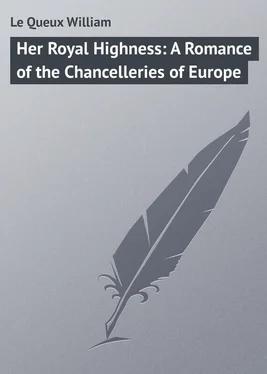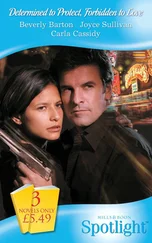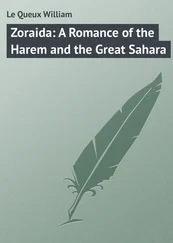William Le Queux - Her Royal Highness - A Romance of the Chancelleries of Europe
Здесь есть возможность читать онлайн «William Le Queux - Her Royal Highness - A Romance of the Chancelleries of Europe» — ознакомительный отрывок электронной книги совершенно бесплатно, а после прочтения отрывка купить полную версию. В некоторых случаях можно слушать аудио, скачать через торрент в формате fb2 и присутствует краткое содержание. Жанр: foreign_prose, на английском языке. Описание произведения, (предисловие) а так же отзывы посетителей доступны на портале библиотеки ЛибКат.
- Название:Her Royal Highness: A Romance of the Chancelleries of Europe
- Автор:
- Жанр:
- Год:неизвестен
- ISBN:нет данных
- Рейтинг книги:4 / 5. Голосов: 1
-
Избранное:Добавить в избранное
- Отзывы:
-
Ваша оценка:
- 80
- 1
- 2
- 3
- 4
- 5
Her Royal Highness: A Romance of the Chancelleries of Europe: краткое содержание, описание и аннотация
Предлагаем к чтению аннотацию, описание, краткое содержание или предисловие (зависит от того, что написал сам автор книги «Her Royal Highness: A Romance of the Chancelleries of Europe»). Если вы не нашли необходимую информацию о книге — напишите в комментариях, мы постараемся отыскать её.
Her Royal Highness: A Romance of the Chancelleries of Europe — читать онлайн ознакомительный отрывок
Ниже представлен текст книги, разбитый по страницам. Система сохранения места последней прочитанной страницы, позволяет с удобством читать онлайн бесплатно книгу «Her Royal Highness: A Romance of the Chancelleries of Europe», без необходимости каждый раз заново искать на чём Вы остановились. Поставьте закладку, и сможете в любой момент перейти на страницу, на которой закончили чтение.
Интервал:
Закладка:
Le Queux William
Her Royal Highness: A Romance of the Chancelleries of Europe
Chapter One.
The Nile Travellers
The mystic hour of the desert afterglow.
A large, square wooden veranda covered by a red and white awning, above a wide silent sweep of flowing river, whose huge rocks, worn smooth through a thousand ages, raised their backs about the stream, a glimpse of green feathery palms and flaming scarlet poinsettias on the island opposite, and beyond the great drab desert, the illimitable waste of stony, undulating sands stretching away to the infinite, and bathed in the blood-red light of the dying day.
On the veranda sat a crowd of chattering English men and women of wealth and leisure – taking tea. The women were mostly in white muslins, and many wore white sun-helmets though it was December, while the men were mostly in clean suits of “ducks.” An orchestra from Italy was playing Musetta’s waltz-song from “La Bohème,” and the same people one meets at the opera, at supper at the Savoy or the Ritz, were chattering over tea and pastries served by silent-footed, dark-faced Nubians in scarlet fezes and long white caftans.
The Cataract Hotel at Assouan is, at five o’clock, when the Eastern desert is flooded by the wonderful green and crimson of the fading sun, the most select yet cosmopolitan circle in all the world, the meeting-place of those seekers after sunshine who have ascended the Nile to the spot where rain has never fallen within the memory of man.
The poor old played-out Riviera has still its artificial attractions, it is true. One can, for once in one’s life, enjoy the pasteboard of the Nice carnival, the irresponsible frolic of the Battle of Flowers, the night gaiety of Ciro’s, breathe the combined odour of perspiration and perfume in the rooms at Monte, eat the gâteaux at Vogarde’s, play the one-franc game of boule at the Casino Municipal, or lunch off the delicious trout from the tanks at the Reserve at Beaulieu. But the Cote d’Azur and its habitués, its demi-mondaines and its escrocs soon pall upon one; hence Society nowadays goes farther afield – to Egypt, the land of wonders, where there is ever-increasing charm, where the winter days amid those stupendous monuments of a long-dead civilisation are rainless, the land where Christmas is as warm as our English August, where all is silent and dreamy beside the mighty Nile, and where the brown-faced sons of the desert kneel Mecca-wards at sunset and praise the name of Allah the One. Allah is just; Allah is merciful. There is no God but Allah!
Some winter idlers go to Cairo, and there indulge in the gaieties of Shepheard’s, the Savoy, or the Gezireh Palace, or the teas and dances at Mena House, or the breath of freedom at Heliopolis. But Cairo is not Egypt. To see and to know Egypt one must ascend the Nile a farther eight hundred miles to Luxor – the town where once stood ancient Thebes, the City of a Hundred Gates, or to Assouan, the Aswan of the days of the Pharaohs.
It is there, on the borders of the glowing desert of Nubia, far removed from the stress of modern life, that one first begins to experience the new joy of existence – life in that limitless wilderness of sky and sand, life amid the relics of a mighty and wonderful age long since bygone and forgotten.
On that afternoon of early December a merry party of four young people – two girls and two men – sat at one of the small tables on the veranda.
The gay quartette, waited upon by Ahmed, an erect bronze statue, picturesque in his white caftan and red sash, were laughing merrily as the elder of the two men recounted the amusing progress of a party whom he had accompanied on camels into the desert that afternoon.
Around them everywhere was loud chatter and laughter, while the orchestra played dreamily, the music floating across the slowly darkening river which flowed on its course from unexplored regions of Central Africa away to the far-distant Mediterranean.
“I went across to Philae this morning to see the temples – Pharaoh’s Bed, and the rest. Hardy pulled me out of bed at six o’clock,” exclaimed the younger of the two men – a tall, clean-shaven Englishman of a decided military type. “But I must confess that after flogging the Nile for nearly three weeks and Mahmoud taking us to see every temple along its banks, I’m getting just a bit fed up with antiquities and ruins.”
“Oh, my dear fellow,” cried the elder man in quick reproach, “you must never admit such a thing in Upper Egypt. It’s horribly bad form. Mademoiselle will agree – eh?”
And the broad-shouldered, handsome man of thirty-five or so in a clean white linen suit leaned back in his chair and laughed at the pretty, dark-haired vivacious French girl he had addressed. She was not more than twenty, with a refined oval face, wonderfully expressive eyes, and a small delicate mouth which parted as she shrugged her shoulders and smiled back at him in assent.
“Ah, Waldron, but you’re a diplomat, you know!” replied the younger man. “You fellows always say the right thing in the right place. We chaps in the Service, however, have a habit of speaking bluntly, I fear.”
“It is just as easy to be diplomatic, my dear Chester, as to be indiscreet,” replied the Honourable Hubert Waldron, M.V.O., who was second secretary at His Britannic Majesty’s Embassy at Madrid, and was now on leave for a winter holiday.
Not yet forty, a smart, well-groomed, athletic, clean-cut Englishman, he nevertheless possessed the distinct Foreign Office air, and was, at the same time, a cosmopolitan of cosmopolitans. Essentially a ladies’ man, as every good diplomat should be, he was, in addition, decidedly handsome, with pale, refined features, a strong face with straight nose, a pair of dark, deep-set, thoughtful eyes, and a dark, well-trained moustache.
At Court functions, balls, receptions, official dinners and such-like festivities when, with his colleague, he was bound to be on show in his perfect-fitting diplomatic uniform, women always singled him out as a striking figure, as, indeed, he was, and at Stockholm, Brussels, and Lima, where he had respectively served as attaché he had attained great popularity among the corps diplomatique , and the gay, giddy world of Society which, in every capital, revolves about it.
The quartette had made each other’s acquaintance since leaving Cairo, having found themselves fellow-passengers on board the fine new river-steamer, the Arabia – members of a smart party of wealthy idlers which included two of America’s most famous millionaires. The party numbered thirty, all told, and during the three weeks they had travelled together and had all spent a time which each declared to be the most delightful of their lives.
The younger Englishman was Chester Dawson, son of Sir Forbes Dawson, M.P., and a lieutenant in the 19th Hussars, who, like Waldron, was on leave, while of the two ladies the younger was French, though she spoke English perfectly, and the other, ten years her senior, was slightly angular and decidedly English.
Mademoiselle Lola Duprez had attracted Hubert Waldron from the first moment when they had met on the upper deck an hour after leaving Cairo. She was bright, vivacious, and extremely chic , possessing all the daintiness of the true Parisienne without her irritating mannerisms. Slightly petite , with an extremely pretty and refined face, big eyes, a perfect complexion and a slim, erect figure, she was – judged from the standpoint of a connoisseur of female beauty as Hubert Waldron undoubtedly was – unusually beautiful and attractive. On many of the excursions into the desert when the party had landed to visit the ancient monuments, the pyramid of Sakkâra, the Tomb of Thi, the temples of Abydos Denderah and the rest, Hubert had ridden a donkey at her side, or spent the long, idle, sunny afternoon hours on deck, lolling in the padded cane-chairs sipping coffee and gossiping as the steamer, with its Arab reis or pilot squatting in the bow smoking cigarettes, made her way up the broad stream.
Читать дальшеИнтервал:
Закладка:
Похожие книги на «Her Royal Highness: A Romance of the Chancelleries of Europe»
Представляем Вашему вниманию похожие книги на «Her Royal Highness: A Romance of the Chancelleries of Europe» списком для выбора. Мы отобрали схожую по названию и смыслу литературу в надежде предоставить читателям больше вариантов отыскать новые, интересные, ещё непрочитанные произведения.
Обсуждение, отзывы о книге «Her Royal Highness: A Romance of the Chancelleries of Europe» и просто собственные мнения читателей. Оставьте ваши комментарии, напишите, что Вы думаете о произведении, его смысле или главных героях. Укажите что конкретно понравилось, а что нет, и почему Вы так считаете.












